1987: Remembering "Maurice"
 Saturday, November 14, 2020 at 3:00PM
Saturday, November 14, 2020 at 3:00PM 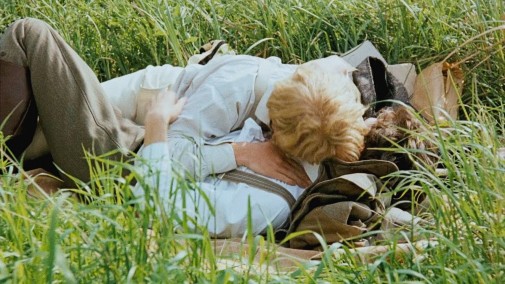
Director James Ivory and producer Ismail Merchant met in 1959, and quickly started a romantic and professional partnership. It lasted for 44 years until Merchant's death. Along with screenwriter, Ruth Prawer Jhabvala, they made a name for themselves with the production of prestigious literary adaptations. Their first brushes with success came in the late 70s and early 80s, but it was in 1985 and 1986 that their lives changed. A Room With a View, their first E.M. Forster adaptation was a huge hit, both with critics and audiences. The picture even won three Oscars, including for Best Adapted Screenplay.
Following such a triumph, one would expect Merchant & Ivory to bask in their glory, perchance repeating the formula of their success. They did end up adapting another of Forster's works, though they chose what, at the time, was the author's least known and least respected book. The result of this unexpected turn was one of the pair's most personal pictures. In 1987, the movie was received with lukewarm enthusiasm, but, as far as I'm concerned, Maurice is one of their very best efforts…
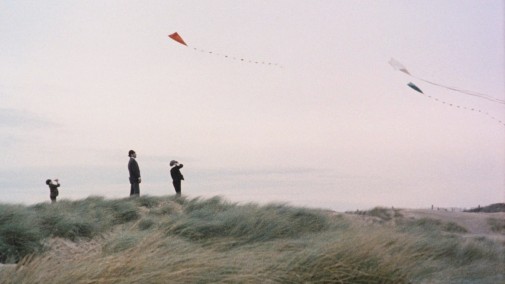
E.M. Forster started writing Maurice (pronounced Morris) in 1913. He finished the first draft the following year and kept revising the piece throughout his life. Due to its frank depiction of men who love and have sex with other men, the book was never published while the writer was alive. Pulling from personal experience as a gay man living in Edwardian England, Forster had dared to write a story where queer characters weren't punished by some dooming tragedy. The men of the novel dare to think themselves human, to believe they're entitled to happiness just like anybody else.
Only in 1971 did Maurice see the light of day, though it was quickly dismissed by critics and academics, and declared a minor work with little fanfare. That's why it's so odd that Merchant & Ivory would turn to it after their first brush with mainstream success. In any case, it was a brave decision. The pair's filmography had, by then, solidified around a reputation of stuffy Oscar bait, a collection of Tories' wet dreams bedecked in period finery. Nowadays, many still associate their name with mirthless period dramas.
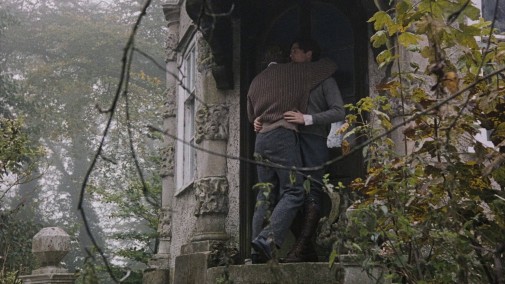
The reality of their work is much more complex. Neither Merchant nor Ivory, nor Jhbvala for that matter, were members of the social classes they immortalized on celluloid. They were outsiders looking into British high society. Unlike other makers of period dramas, these filmmakers didn't bring modernity to the past, refusing to filter historical settings through contemporary style to make it palatable to viewers. Instead, they resurrect days gone by and forced the audience to adapt, to dialogue with the screen, immersing the spectator in the particularities of an alienating period.
It should also be noted that, whilst being the product of gay artists, the Merchant Ivory flicks rarely reflected their makers' sexuality directly. They were produced during the years of Thatcher, after all. The narratives are often brimming with repressed desires under a cover of British decorum. Most of their heroes may be outwardly straight, but their inability to express their wants, their fiery loves, and seismic passions, in ways acceptable to society is something every queer person can likely relate to. In Maurice, this subtext becomes text.
In that regard, it represents a queering of the period film, its subversion living in the unwavering discipline of the execution. It's daring to present gay love with the same language of BBC-sponsored dramas, the blossom of forbidden lusts clashing with the conservative style. The intromission of gay desire into the velvet-walled dining rooms of Edwardian England is like rainwater finding its way into one of those ancient buildings, leaking from the ceiling and disturbing everyone around.
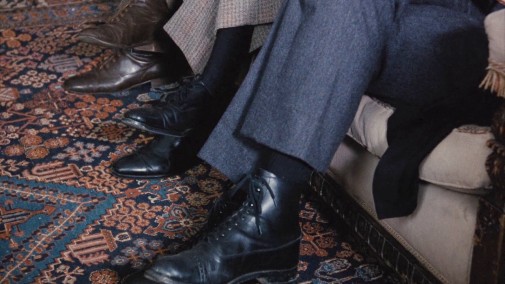
The story, centered around Maurice Hall's romantic adventures at the start of the 20th century, may seem tame, even cold in its aloofness. However, the emotions are red-hot when provoked and there's psychological acuity to be found if the spectators let themselves succumb to these sad young men falling in and out of love with one another. It's gentle too, making its bouts of cruelty all the more cutting. In other circumstances, the blade of romantic disappointment would be dull. Here, it's razor-sharp, drawing blood with the slightest caress.
Love is shaped, like all things, by the places we inhabit, the times we live, and how our community exists in the world. It's nice to dream of passion capable of bringing down any and every barrier, but real life is rarely so rosy. In distilling Forster's text, Ivory paid great attention to detail, even when it was abrasive. Instead of looking for commonplace universality, his approach indulges the specificities of the period, its ugly side too. Like Ben Kinglsey says at one point: "England has always been disinclined to accept human nature." Class is thus seen as a prison, its rules, and prejudices stifling humanity.
Fittingly, the camera often observes the details of Edwardian masculinity with keen focus, seeing objects rather than people, illuminating the absurdities of pageantry and their repressed sensuality. It's almost as if the director's trying to stare at the stiff collars, patent leather shoes, and wool suits until they combust from the intensity of the gaze. Maybe if one looks long enough, desire will finally manifest externally, denuding hot skin from the trappings of posh costume. It's homoeroticism wrapped in Oscar-nominated tweed.
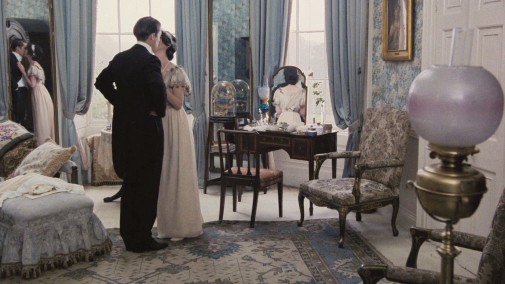
Still, there's a wintery whisper blown over the whole repressed affair, chilliness emanating from the screen like the cloud of vapor that cascades out of an open fridge. Shadows look blue and white. Silk shines like a glacier under in the sun. The mood highlights the unease, the carnivorous hostility that lives in the stiff upper lip of English lords and ladies.
One often feels like those penguins in top hats, those harpies in lacey parasols, only need the hint of impropriety before they pounce on the offending party. The aroma of social obsolescence permeates the air just as it did in Ray's The Music Room and Visconti's Leopard. This is a dying world, a social order that's bound to be mortally wounded by the advent of World War I and the dissolution of the British Empire.
Maurice is no message picture despite these aspects, being more character study and sentimental chronicle than a galvanizing screed. In many ways, it's a coming-of-age narrative about people who can't outwardly grow, their evolving selves having to stay hidden from sight. Ivory underlines this when taking the film to the character's level, never condescending to them but choosing a path of prickly empathy. This also manifests in the actors' work.
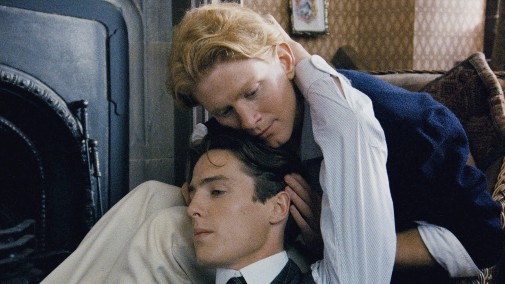
Notice Hugh Grant as Clive Durham, the caddish source of Maurice's sexual awakening. A weaselly performance, Grant's work is quite the feat of weaponized movie star charisma. One expects passionate ardor from him, an idealized vision of weepy feeling. Instead, what we get is the portrait of a scoundrel, a man so paralyzed by the fear, he lets himself be metaphorically neutered. Grant's Clive retreats so thoroughly into himself that, by the end, he's an empty shell. Hauntingly, his eyes have no light in them. They're two voids glowering from within his skull.
James Wilby as Maurice is astounding, even more so than Grant. At first, one feels he's too retracted, so committed to playing repression he often looks on the verge of falling asleep. However, the shock of love adds notes of glee to his performance, illuminating the stiffness with joy. Later, when heartbreak comes a-knocking, Wilby's Maurice falls apart in a shocking mess of inchoate pain. The floodgates are opened so suddenly we get whiplash, the dolor of this man rubbing against the period trappings like a caged animal smashes against its cage.
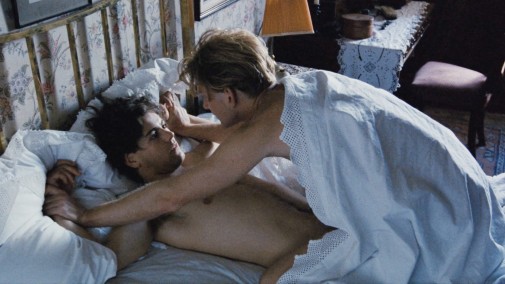
But then, there's Alec Scudder, an employee of the Durhams. After the unhappy affair of Maurice and Clive dominates the picture's first hour, the lowly Scudder's the one that leads its closing chapters and brings upon a shocking conclusion. Rupert Graves takes on the responsibility of Alec and he's like a lustful explosion. The accent may sound forced, but the actor makes up for it with industrial doses of charm. Like Maurice, we feel compelled to run into the world of sensual pleasure that's promised by Alec's glorious smile. Their entanglement is a violation of countless social rules, but each touch, stolen kiss, and carnal knowledge, muffles the fears of repercussion.
In Ivory's own words, Maurice is a film about "muddled, privileged people living a lie or ready to live a lie". Clive certainly chooses to live like that, but the catharsis of the picture comes from the titular character's refusal to do so. By the end, sweet happiness may be out of reach, but deadening repression may have been sidestepped too. Even if only temporarily, Maurice is happy with Alec, a gentle ephemerous feeling that still makes the ending quite revolutionary in a panorama full of tragic stories of dying queer people. This tale ends with the promise of an unresolved future, but it's not marked by death or by smothering melancholy. It's hopeful, beautifully so.
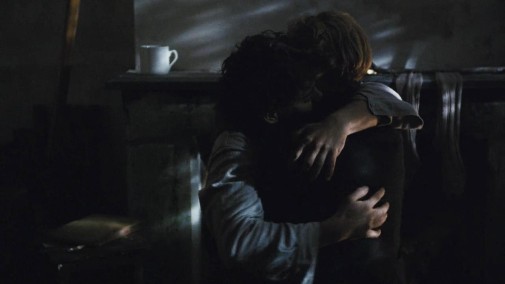
Maurice is available to stream on the Criterion Channel and Kanopy.



Reader Comments (21)
Thanks to the team for covering Maurice! This is a wonderful movie. I'm not sure what versions are streaming, but, for anyone seeking out the DVD, try to find the restoration by Cohen Media, released in 2017. The picture there is glorious, leaps and bounds better than that of the version released on DVD in the nineties.
Love love love this movie. Hugh Grant is spectacular in it. My favorite Merchant Ivory film.
It''s something very special. Wilby is quite good but to me Grant and Graves are knockouts, and the ending is such a happy/sad punch.
I was very impressed with this on rerelease. so much better than i remember it being. But i disagree on Wilby. I think he's the weakest link in the trio and since he's the lead it prevents the picture from being an undeniable classic (difficult role!)
Great read, Cláudio. Oh my, Maurice, watching it on opening night, barely seventeen, that crying out to the night for a lover that comes then through the window! Was there also rain in that scene? I cannot remember clearly, never saw it again but i cherish the original soundtrack on vinyl.
I love this movie, maybe it's not the best, but it was the first gay romantic movie I watched and moved me very much.
One of the most beautiful and romantic gay theme films ever made
For all the fuss about gay actors in gay roles (and I guilty of stirring the pot), Rupert Graves, heterosexual husband and father of five, is pretty damn wonderful in the film.
One of my all time favorites. A stunning masterpiece.
I remember finding this to be a beautifully made and well-acted film, but leaving me a little cold. I haven't revisited it, but I really should soon because I have a sense that it would play a lot better for me now.
"Neither Merchant nor Ivory, nor Jhbvala for that matter, were members of the social classes they immortalized on celluloid. They were outsiders looking into British high society." Not just British HIGH society, but British society, period. James Ivory was born in California, and grew up in rew up in Klamath Falls, Oregon. Merchant was from Bombay, and Jhbvala from Germany. You don't make the mistake of suggesting they were British, but it's important to note, clearly they weren't, so it's not just that "they were produced during the years of Thatcher." They were producing during Reagan, too, and their films were set all over, from India to Kansas City, Paris to Argentina. MR. AND MRS. BRIDGE (Kansas) and THE CITY OF YOUR FINAL DESTINATION (Argentina) are two of their finest films. Their home base was, I think, New York.
I was actually sneaked onto the grounds of the Sundance Institute in Provo Canyon to see an advanced screening of MAURICE when Merchant and Ivory were there at a producers conference one summer. I walked past the two that evening between dinner and the screening. They were walking down a forest path with Jessica Tandy and Hume Cronyn. I'll remember that moment till the day I die.
Amory Blaine -- I have both versions and you are absolutely correct. The restoration is beautiful, and it better highlights the chilly cinematography of the picture.
eurocheese -- I would have nominated him for Best Supporting Actor.
ScottC -- The ending is marvelous and its tinges of hopefulness still surprise me on re-watches.
NATHANIEL R -- I'm afraid I'm like the Venice jury that awarded Wilby and Grant a shared Best Actor prize. I love those two and, while I appreciate Graves' charm, he's the weak link among the trio for me.
Toby Dammit -- Rupert Graves climbing through a window on a cold night, perfectly charming and intent on ravishing you is the stuff dreams are made of.
thefilmjunkie -- As previously mentioned, if you do seek it out, try to find the 2017 restoration.
Dan Humphrey -- Believe it or not, I did have that information on this piece's first draft. Furthermore, I mentioned how Ivory came from a working-class background as his father was a sawmill operator, and that Jhbvala was a German Jew whose family fled the Nazi regime in 1939 when she was only a kid. Unfortunately, I can't include all of that in the write-up. My articles are already too long and I must make cuts somewhere.
That being said, I'm thankful that you mention it in the comments so that other readers can find the information on this page. Also, thanks for sharing that lovely memory.
Yes, Rupert Graves is my husband. We're very happy.
And if James Ivory had directed Call Me By Your Name he would take the film to another level. Maurice level, which is pure perfection, like the best of his works, Remains of The Day, Howards End and A Room With A View.
Feline Justice -- As a huge CALL ME BY YOUR NAME fan, I'm not sure I would have preferred Ivory's version of the film. Without Guadagnino editing Ivory's early script, for instance, the film would have a ton of unnecessary narration. I'm happy with the final result as it is, and remain ecstatic at Ivory's Oscar win.
I love Maurice. At a time when gay-themed movies came off as morality tales or the acting felt so forced, this one feels achingly real and natural. I think for its time, as AIDS was ravishing the gay community, people were surprised that this team focused on a gay period romance. I think too many people at the time reacted to the surface and the fact they wanted Merchant and Ivory to do more of the same. Merchant and Ivory did so but boldly told a gay love story with so manyayers. They forced their fans to open their eyes and se1efore, love this movie.
Cláudio, I was sure you knew, but like you said, it's worth always mentioning, since there seem to be a lot of people who think he's British. We hear it all the time...
I just recently saw this again after many years. I remember all the criticism at the time that everyone was too stiff or cold, and my feeling was that the stiffness was the point! I think most people loved A Room With A View because it felt sort of warm and cuddly, but Maurice felt more real to me. More of the trap that people were really living in.
Yes, climbing through the window may be borderline fantasy but I hope that everyone in life can get that one moment of passion to last a lifetime.
I wish there were more gay romantic period movies like this
Thanks Cláudio. Another great read.
This is my favourite screen adaptation of a gay story. Sometimes with films based on books I've read (Brokeback, CMBYN) elements of what made the written work special for me are missing or distorted, but not with Maurice. I've read the novel three times and read a lot of what Forster said about the writing of it. They got it right.
Forster said without the hopeful ending he wouldn't have written the book. His task was to make that hopeful ending convincing. He had to show the men overcoming obstacles and their own insecurities, hence the back and forth before the final boathouse scene.
At one point (it's been a few years) I think Scudder asks 'Where can we go?' and someone at my first screening shouted out 'San Fransisco'. I hope they made it.
I only watched this last week for the first time and thought it wonderful.